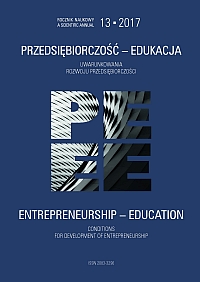The Role of Tourism in the Development of Cross-Border Areas Based on the Example of the Neman Euroregion
DOI:
https://doi.org/10.24917/20833296.13.11Keywords:
Euroregion, tourist traffic, tourism, transborder areaAbstract
The purpose of this publication is to present the role of tourism as a factor in determining the development of cross-border areas. The article provides the reasons and basis for cross-border tourism development. It also describes the origins, causes and legal regulations regarding the functioning of euroregions, as well as characterises the importance of tourism in economic activation of border areas. The paper also contains statistical data and their analysis in the context of the changes that have taken place in recent years. Euroregion Neman serves as the source for considerations. The article also attempts at forecasting the future situation in cross-border tourism and the role of this Euroregion in the future. Literature on this subject is quite rich. The article was written with the use of books and press releases, as well as statistical data and Internet sources. Research method used in the article is a review of literature covering analysed topics. The research takes into account quantitative and qualitative data on tourism in the cross-border areas. Analysis of statistical data constitutes the research tool of the article. Results of the research clearly indicate the important role of tourism in the economic activation of all countries of the cross-border area. Conclusions that can be drawn on their basis clearly indicate the desirability of the existence and functioning of Euroregions in Europe, and in particular of the Euroregion Neman. The euroregion itself is a factor stimulating and developing tourism activity.References
Borys, T., Panasiewicz, Z. (1997). Panorama euroregionów. Jelenia Góra: Urząd Statystyczny w Jeleniej Górze.
Czekaj, M. (red.) (2007). Euroregiony na granicach Polski. Wrocław: Urząd Statystyczny we Wrocławiu.
Euroregiony w granicach Polski 2007. Pozyskano z: http://wroclaw.stat.gov.pl/euroregiony-na-grani-cach-polski-2007-202/.
Europejska karta regionów granicznych i przygranicznych. Nowelizacja. (2004). Pozyskano z: http://iso.karpacki.pl/pliki/EKRG200805032703.pdf
http://pracownia.org.pl/dzikie-zycie-numery-archiwalne,2139,article,2843
http://wtir.awf.krakow.pl/pdf/studenci/strony_st/projekty/litwa/jakub_gabrys.pdf
http://wtir.awf.krakow.pl/pdf/studenci/strony_st/projekty/litwa/patrycja_serafin.pdf
Klima, E. (2001). Euroregiony – czy regiony. W: A. Jewtuchowicz (red.), Strategiczne problemy rozwoju regionów w procesie integracji europejskiej, Zakład Ekonomiki Regionalnej i Ochrony Środowiska. Łódź: Uniwersytet Łódzki.
Kondracki, J. (2001). Geografia regionalna Polski. Warszawa: Wydawnictwo Naukowe PWN.
Kruczek, Z. (2008). Polska. Geografia atrakcji turystycznych. Kraków: Wydawnictwo Proksenia.
Kulesza, E. (2003). Współpraca transgraniczna jako czynnik rozwoju lokalnego na przykładzie gmin polskiego pogranicza z Rosją. Toruń: Wydawnictwo Adam Marszałek.
Malendowski, W., Szczepaniak M. (2000). Rola euroregionów w procesie integracji europejskiej. W: W. Malendowski, M. Szczepaniak (red.), Euroregiony – mosty bez granic. Warszawa: Dom Wydawniczy Elipsa.
Małecka, E. (2004). Euroregiony na granicach Polski 2003. Wrocław: US Wrocław.
Moraczewska, A. (2008). Transformacja funkcji granic Polski. Lublin: Wydawnictwo Uniwersytetu Marii Curie-Skłodowskiej.
Mydel, R., Balon, J. (2002). Atlas Polski. Tom 2, Kraków: Oficyna Wydawnicza Fogra.
Szczepanowski, A.E. (2013). Walory i atrakcje turystyczne województwa podlaskiego. Tom II. Walory przyrodnicze. Białystok: Wydawnictwo Wyższej Szkoły Finansów i Zarządzania w Białymstoku.
Trojanowska-Strzęboszewska, M., (2005). Krótka charakterystyka granic wschodnich III RP. W: J. Kurczewska, H. Bojar (red.), Granice na pograniczach. Warszawa: Wydawnictwo Instytutu Filozofii i Socjologii PAN, 29–33.
Zdulski, M. (2002), Polskie doświadczenia we współpracy transgranicznej. Realizacja Funduszu Małych Projektów PHARE CBC Jelenia Góra.
Żukowski, A. (2006), Polska wobec obwodu kaliningradzkiego Federacji Rosyjskiej, Olsztyn: Wydawnictwo Uniwersytetu Warmińsko-Mazurskiego w Olsztynie.
Downloads
Published
How to Cite
Issue
Section
License
Articles are published under the terms of the Creative Commons License (CC BY-ND 4.0; Attribution– NoDerivs).

